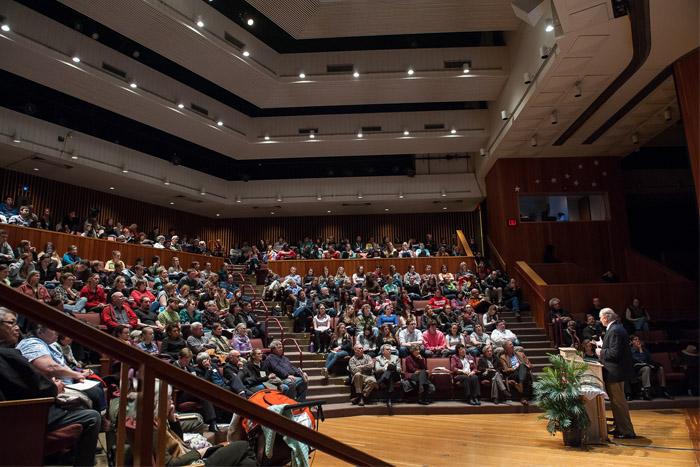Sustainability Series

Addressing the Most Critical Challenges of the 21st Century
Improving the human condition—equitably, sustainably and within limits that protect the natural environment—is perhaps the critical challenge of the 21st century. The Clarke Forum and the Center for Sustainability Education (CSE) will host a seminar series in spring 2013 that will explore this challenge from multiple perspectives, integrating the arts, humanities, social sciences and natural sciences. Topics will range from the local to the global and include practical models for:
- building sustainable communities
- the social, environmental and health effects of developing natural gas in Pennsylvania and Mozambique
- social movements to combat global climate change
- and interpreting and responding to planetary boundaries.
The seminar series will consist of a Dickinson faculty study group, the Baird Honors Colloquium for students, classroom visits and public events featuring high-profile visiting speakers. The series will demonstrate Dickinson's commitment to global sustainability through the interdisciplinary liberal-arts lens and inform the continued infusion of sustainability across the college's curriculum.
The following events are open to the public. Follow each link for speaker biographies and more information.
Michael Shellenberger, Love Your Monsters: Why Technology Will Save the World
January 29, 2013 | 7:00 pm | Stern Great RoomShellenberger is President of the Breakthrough Institute, a "a paradigm-shifting think tank committed to modernizing liberal thought for the 21st century" that seeks to "accelerate the transition to a future where all the world's inhabitants can enjoy secure, free and prosperous lives on an ecologically vibrant planet." He is co-author with Ted Nordhaus of the 2007 book Break Through and the essay "The Death of Environmentalism," which sparked a national debate. In this public lecture, Shellenberger will describe why technology is the key to dealing with the world's toughest environmental problems, from climate change to rainforest destruction to species extinction.
Peter Bechtel '81 and Ruth Mkhwanazi-Bechtel, Sustainable Development in Mozambique
February 27, 2013 | 7:00 pm | Stern Great RoomPeter Bechtel, a 1981 Dickinson graduate, worked with the World Wildlife Fund in Mozambique on environmental resource management and wildlife conservation strategies that integrate the livelihoods of local peoples. He is now consulting on how Mozambique can develop its natural gas reserves in responsible and sustainable ways. Ruth, his wife, works on community development, women's and gender issues, public health and how these issues relate to natural resource use and development. They will share the story of how Mozambique has been near the bottom of the U.N. Human Development Index, but recent discoveries of gas, coal and mineral deposits have created opportunities for rapid economic development.
Human Dimensions of Natural Resource Extraction Panel
March 5, 2013 | 7:oo pm | Stern Great RoomThis interactive panel discussion will explore social dimensions, community concerns, environmental impacts and policy issues associated with natural resource development in Pennsylvania and Mozambique. The panel will include Peter Bechtel '81, Tim Kelsey (Penn State University), Veronica Coptis (Center for Coalfield Justice-Greene County) and Erika Staff (PennEnvironment). The panel will be moderated by Julie Vastine, director of [LINK] ALLARM at Dickinson College.
David Orr, Designing Resilience in a Black Swan World
March 27, 2013 | 7:00 pm | ATS AuditoriumOrr, the Paul Sears Distinguished Professor of Environmental Studies and Politics at Oberlin College, has published a number of widely read books on humans' relation with nature, including Hope Is an Imperative, Down to the Wire, Ecological Literacy and Earth in Mind. Orr is one of the organizers of The Oberlin Project, a "full-spectrum" sustainable development project that is a partnership among the town of Oberlin, Ohio, Oberlin College and others.
Black swan events are those with low or unknown probability, but high, long-lived and often global impacts. They affect financial markets, climate, public safety, human health and more. This public lecture addresses how we can begin to design communities, regions and nations to improve resilience and prosperity.
Bill McKibben, Front Line of the Climate Change Fight
April 11, 2013 | 7:00 pm | ATS AuditoriumMcKibben, the Schumann Distinguished Scholar at Middlebury College, is the author of a dozen books about the environment, including The End of Nature, Deep Economy: The Wealth of Communities and the Durable Future and Hope, Human and Wild. McKibben is the first recipient of the Rose-Walters Prize at Dickinson College for Global Environmental Activism. During his public lecture, McKibben will talk about the 350.org campaign for divestment from fossil fuels, the science behind the fight and the evolving politics.
Published January 24, 2013